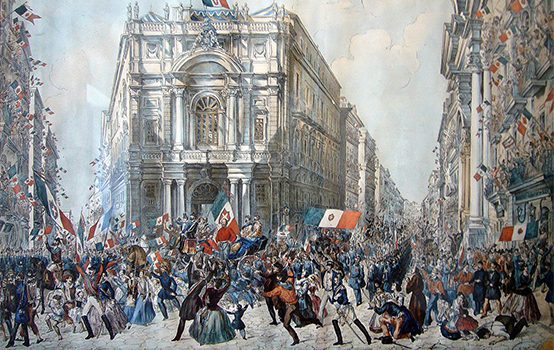The “Paradox” of Transnational Nationalism

Damon Linker has a good column in The Week about the launch of American Affairs, a new journal which, in Linker’s words, aims to “explore the meaning and shape of American nationalism in the age of Trump.”
Linker’s main point — and it’s a trenchant one — is to note the belatedness of the effort: National Review and Public Interest took years or even decades to bring the fusionist New Right and neoconservatism respectively to a position of political dominance, whereas American Affairs was only founded after Trump’s unexpected triumph. But I want to comment on something Linker says at the end of the piece about our nationalist moment:
The central paradox of the present historical moment is that nationalism is on the rise — but the trend is taking place simultaneously across the West, as a kind of byproduct or inverse of internationalism itself. Trump himself seems to understand intuitively that he’s part of something bigger than himself. Hence the cheerleading for Brexit, support for the National Front’s Marine Le Pen in France, criticism of Germany’s Angela Merkel, praise for Russia’s Vladimir Putin and other authoritarians, and more far-reaching mischief-making with regard to NATO and the European Union.
I totally agree that this is the essential trend — and that it requires explanation that extends beyond domestic factors. But I’m not sure why it’s a paradox.
In the 1930s, nationalism was also on the rise, along with its hypertrophied cousin, fascism. But the fascists, notwithstanding their fanatical nationalism, shared with and borrowed from each other, and in many cases wound up as allies — the German, Spanish, Italian, Hungarian and Japanese fascists all made common cause with one another.
To some extent, the common cause they made was due to factors unrelated to ideology. Germany, Italy, Japan and Hungary were all revisionist powers, aiming to overturn the established international order and remake it to radically enhance their positions. Poland and China also were ruled by nationalist parties in the ‘30s, but they lined up with the liberal democracies because they were the targets of the revisionist powers.
But to some extent it really was ideological affinity — that factor does seem necessary to explain the extent of the domestic French support for the Vichy regime. And both the major liberal powers (the U.S. and Britain) and the illiberal left-wing regime of the U.S.S.R. took on a distinctly nationalist cast in the 1930s and during the war. Stalin’s Soviet Union got more Russian even before the Great Patriotic War, and Roosevelt’s New Deal drew some of its inspiration from Mussolini’s Italy, even as other aspects were inspired by the radical left and the bulk of it was inspired by prior home-grown experiments within the liberal tradition.
The point being: there’s nothing obviously weird about nationalism, as an outlook, having a transnational dimension. Nationalism is an outlook that is particularist and collectivist. Why shouldn’t people who share that outlook discover they have something in common even if their particularisms differ? After all, traditionalist Evangelicals, Catholics, Mormons, Muslims and Jews discovered they have things in common even though they have radically incompatible theologies, practices and eschatologies.
I’ll give my thoughts on possible transnational factors driving nationalism in subsequent posts.
Comments